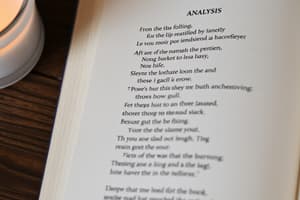Podcast
Questions and Answers
What is one of the primary outstanding qualities of poetry?
What is one of the primary outstanding qualities of poetry?
- Formal structure (correct)
- Narrative style
- Vivid imagery
- Free verse
Which of the following themes is considered a 'personal theme' in poetry?
Which of the following themes is considered a 'personal theme' in poetry?
- Frustration (correct)
- Injustice
- Materialism
- Human suffering
What does the term 'condensed' refer to in the context of poetry characteristics?
What does the term 'condensed' refer to in the context of poetry characteristics?
- Building intricate imagery
- Creating complex emotional responses
- An extended narrative style
- Using fewer words to communicate a big idea (correct)
Which characteristic of poetry emphasizes language that evokes feelings beyond its literal meaning?
Which characteristic of poetry emphasizes language that evokes feelings beyond its literal meaning?
What does the term 'assonance' specifically refer to in poetry?
What does the term 'assonance' specifically refer to in poetry?
How is a poet described in the provided content?
How is a poet described in the provided content?
Which is a quality that does NOT characterize poetry?
Which is a quality that does NOT characterize poetry?
What effect does poetry primarily strive to achieve according to the content?
What effect does poetry primarily strive to achieve according to the content?
Which of the following elements is NOT a common characteristic of poetry?
Which of the following elements is NOT a common characteristic of poetry?
Which figure of speech is particularly important in poetry as mentioned in the content?
Which figure of speech is particularly important in poetry as mentioned in the content?
Flashcards are hidden until you start studying
Study Notes
Understanding Poetry
- Poetry blends artistic expression with human thoughts and feelings, showcasing metaphorical communication.
- It possesses a formal structure where elements function simultaneously, offering a profound human experience.
Effects of Poetry
- Poetry interprets and enhances awareness, evoking emotional and intellectual responses.
- Words in poetry convey deeper meanings, creating rich narratives and worlds of ideas.
Definition of a Poet
- A poet engages deeply with words, improvising and manipulating language, often experimenting with forms like free verse.
- The poet draws from a vast reservoir of sounds, shapes, and imagery, enriching their work.
General Themes in Poetry
- Personal Themes: Explore love, death, loneliness, nature's duality, and the relationship between art and life.
- Social Themes: Address injustice, human suffering, and critiques of materialism and traditional values.
Characteristics of Poetry
- Metaphorical: Utilizes sophisticated language to convey complex ideas.
- Rhythmic: Exhibits beats and paces that enhance meaning.
- Connotative: Contains meanings beyond the literal definitions of words.
- Figurative: Employs various figures of speech to enrich expression.
- Condensed: Communicates ideas succinctly, often through imagery.
- Imaginative: Stimulates creative thought and exploration.
- Emotional: Captures and expresses deep feelings.
- Dramatic: Often characterized by heightened emotions.
- Indirect: Relies on figurative language for nuanced meaning.
- Mysterious: Features complexities that challenge understanding.
- Vivid: Provides clear and evocative descriptions.
- Descriptive: Deeply portrays subjects to captivate readers.
- Concrete: Utilizes visual elements to intensify reader engagement.
- Paradoxical: Creates intrigue, compelling readers to think critically about deeper meanings.
Elements of Poetry
- Alliteration: Repetition of consonant sounds at the start of words or stressed syllables to create rhythm and sonic patterns.
- Assonance: Repetition of internal vowel sounds within lines, contributing to musicality and emotional resonance.
- Figurative Language: Involves meanings beyond the literal; key figures include similes (comparisons using 'like' or 'as') and metaphors (implicit comparisons).
Studying That Suits You
Use AI to generate personalized quizzes and flashcards to suit your learning preferences.




